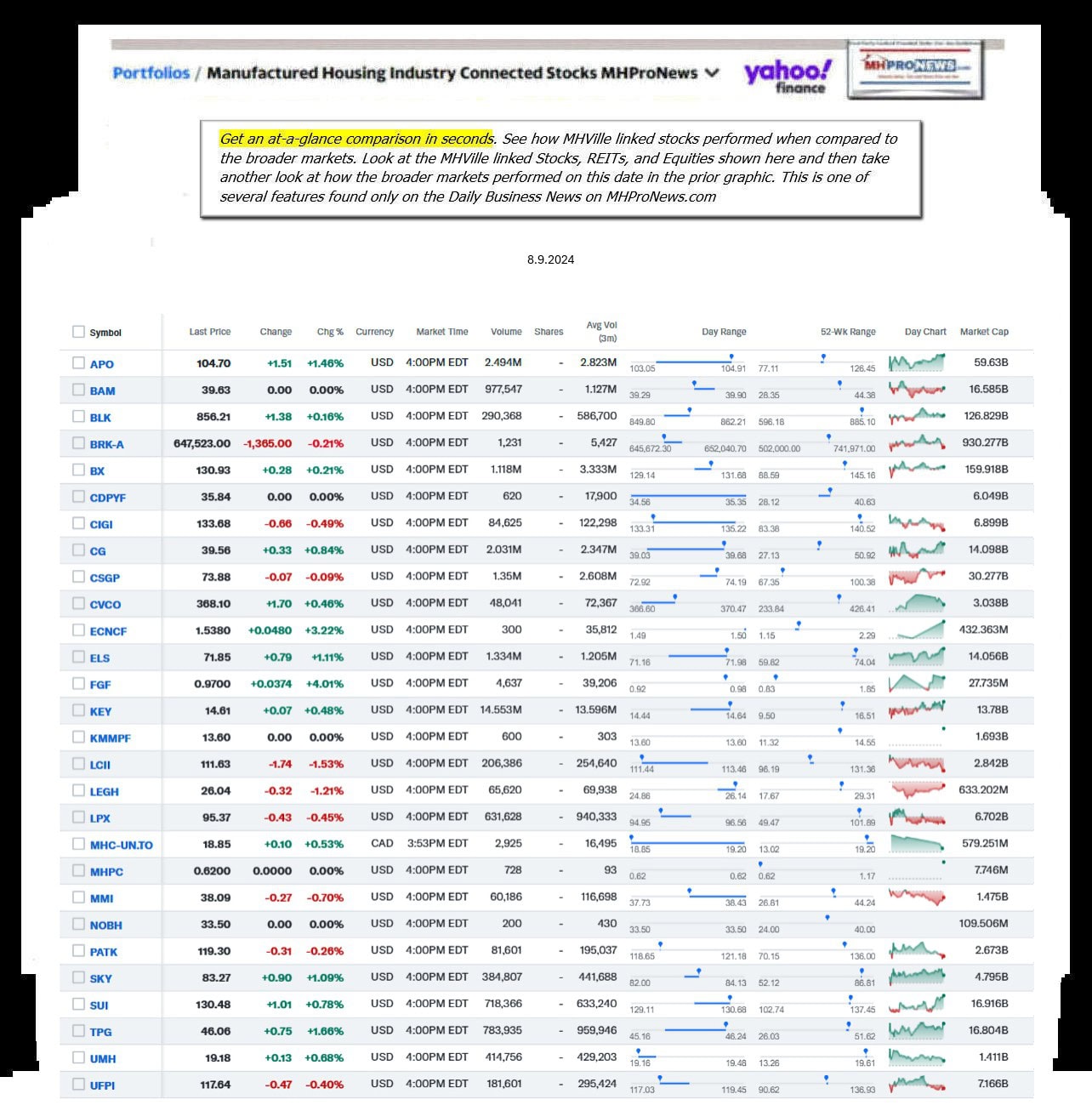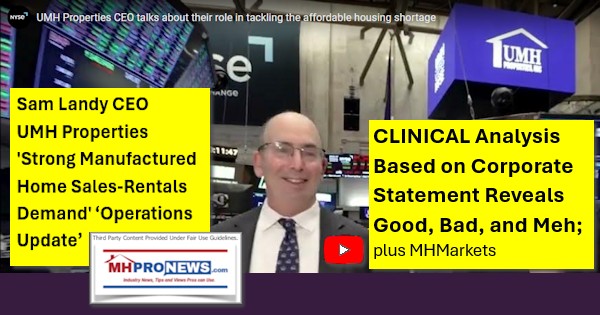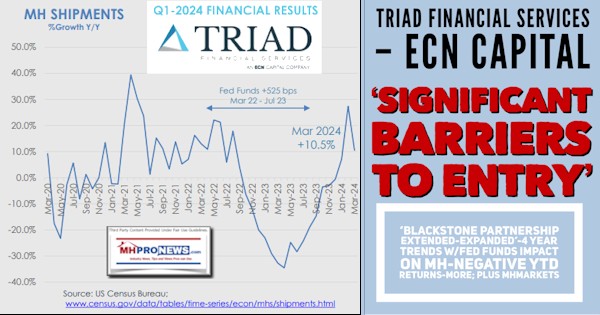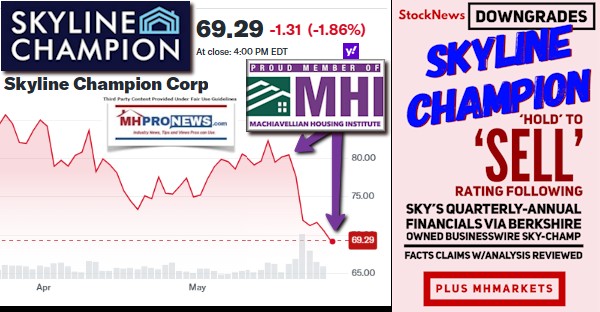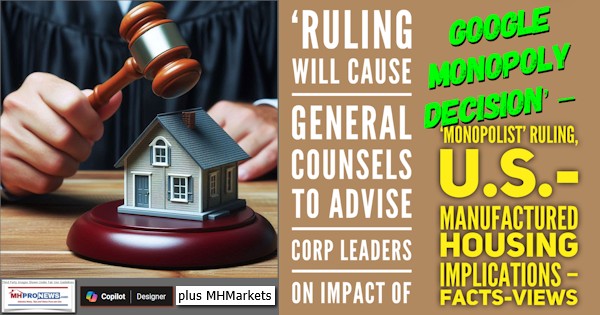
“Google monopoly ruling shows 19th-century law can police Big Tech” said the headline on the left-leaning and Jeff Bezos owned Washington Post. “The first big tech-sector anti-monopoly ruling in a generation challenges the idea that the internet era has outgrown U.S. antitrust law.” Left-leaning Bloomberg Law News said: “Holland & Knight attorneys assess Google’s loss in antitrust case, saying the ruling signals a reluctance by the judge to impose drastic measures.” Perhaps, but in an interview by the Verge with Assistant Attorney General (AAG) Jonathan Kanter, in charge of the Department of Justice (DOJ) antitrust division: “DOJ antitrust chief is ‘overjoyed’ after Google monopoly verdict.” “AAG Jonathan Kanter says the Google monopoly verdict belongs on the ‘Mount Rushmore of antitrust.’” Another headline says that the Google ruling could end up costing Apple tens of billions of dollars in its antitrust case, which may have implications for Warren Buffett led Berkshire Hathaway (BRK), parent company to Clayton Homes, 21st Mortgage Corporation, Vanderbilt Mortgage and Finance (VMF) among several others. Left-leaning antitrust advocate, Big newsletter and Goliath author Matt Stoller said “Well, this decision means monopolization law is back. Exclusive contracts and arrangements are pervasive in American commerce, and until recently, executives could reliably exploit such deals without fearing that they might face any legal liability. But that era is over. This case is in the headlines, which means every single competent executive in America in any firm with market power is going to get a memo from their antitrust or general counsel on what they can and can’t do going forward. And they will likely begin changing their behavior so avoid being brought to court for monopolization.”
It is called in Part I below “a harsh verdict” and ”the most important antitrust case of the century…”
To better understand the issues and insights unpacked in Part II, and how it may have ripple effects through the U.S. economy in general, and manufactured housing more particularly, it will be useful to begin with an introduction to the case provided below by WND News Center to MHProNews. Part III of this article will be our Daily Business News on MHProNews macro- and manufactured housing industry connected equities and markets report.
Part I
WND
‘Harsh verdict’: Landmark ruling says Google is, in fact, a monopoly
‘This is the most important antitrust case of the century, and it’s the first of a big slate of cases to come down against Big Tech’
By Joe Kovacs | August 5, 2024
For those who have a problem with the overarching power of Google, a federal judge on Monday ruled the popular search engine acted illegally to maintain a monopoly in online search.
The 277-page decision by Judge Amit P. Mehta of U.S. District Court for the District of Columbia is being called a landmark ruling that could force tech giants to change their business protocols.
“After having carefully considered and weighed the witness testimony and evidence, the court reaches the following conclusion: Google is a monopolist, and it has acted as one to maintain its monopoly,” Mehta wrote, finding that Google violated the Sherman Act, a major antitrust law.
“This landmark decision holds Google accountable,” said Jonathan Kanter, antitrust chief at the U.S. Department of Justice. “It paves the path for innovation for generations to come and protects access to information for all Americans.”
“This is the most important antitrust case of the century, and it’s the first of a big slate of cases to come down against Big Tech,” Rebecca Haw Allensworth, a professor at Vanderbilt University’s law school told the New York Times. “It’s a huge turning point.”
🚨BREAKING: Google acted illegally to maintain a monopoly in online search. Today Google lost DOJ antitrust suit, with judge finding that it violated antitrust law. This decision confirms what everybody has known for years, Google is a monopoly. This will certainly affect the way… pic.twitter.com/58om26NuYU
— WorldNetDaily (@worldnetdaily) August 5, 2024
The DOJ and a group of American states joined forces against Google four years ago over its practice of paying companies including Apple and Samsung billions of dollars annually for the search engine to automatically handle inquiries on their browsers and phones.
The Verge reported: “Mehta rejected Google’s arguments that its contracts with phone and browser makers like Apple were not exclusionary and therefore shouldn’t qualify it for liability under the Sherman Act. ‘The prospect of losing tens of billions in guaranteed revenue from Google – which presently come at little to no cost to Apple – disincentivizes Apple from launching its own search engine when it otherwise has built the capacity to do so,’ he wrote.”
The New York Times reported: “The ruling is a harsh verdict on the rise of giant technology companies that have used their roots in the internet to influence the way we shop, consume information and search online – and indicates a potential limit of Big Tech’s power.
“It is likely to influence other government antitrust lawsuits against Google, Apple, Amazon and Meta, the owner of Facebook, Instagram and WhatsApp. The last significant antitrust ruling against a tech company targeted Microsoft more than two decades ago. …
“The decision is a major blow to Google, which was built on its search engine and has become so closely associated with online search that its name has become a verb. The ruling could have major ramifications for Google’s success, especially as the company spends heavily to compete in the race over artificial intelligence. Google faces another federal antitrust case over ad technology that is scheduled to go to trial next month.”
In April, “Google agreed to destroy billions of data records to settle a lawsuit claiming it secretly tracked the internet use of people who thought they were browsing privately,” CNBC reported.
In March, a study by the Media Research Center confirmed Google has interfered in American elections an astonishing 41 times in recent years.
Dan Schneider, MRC’s Free Speech America vice president, and Gabriela Pariseau, editor, said in a summary, “MRC researchers have found 41 times where Google interfered in elections over the last 16 years, and its impact has surged dramatically, making it evermore harmful to democracy. In every case, Google harmed the candidates – regardless of party – who threatened its left-wing candidate of choice.”
Their report continued, “From the mouths of Google executives, the tech giant let slip what was never meant to be made public: That Google uses its ‘great strength and resources and reach’ to advance its leftist values. Google’s outsized influence on information technology, the body politic and American elections became evident in 2008. After failing to prevent then-candidate for president Donald Trump from being inaugurated following the 2016 election, Google has since made clear to any discerning observer that it has been — and will continue — interfering in America’s elections.”
##
Part II – Additional Information with More MHProNews Analysis and Commentary
It should be noted that online search impacts almost everything in modern society. The widespread relevance of this case needs no exaggeration. That said, and in no particular order of importance are the following facts, views, and insights.
1) Per left-leaning CNN on 8.6.2024.
“After having carefully considered and weighed the witness testimony and evidence, the court reaches the following conclusion: Google is a monopolist, and it has acted as one to maintain its monopoly,” US District Judge Amit Mehta wrote in Monday’s opinion. “It has violated Section 2 of the Sherman Act.”
Google’s oldest and most important business. The company has spent tens of billions of dollars on exclusive contracts to secure a dominant position as the world’s default search provider on smartphones and web browsers.
Those contracts have given it the scale to block out would-be rivals such as Microsoft’s Bing and DuckDuckGo, the US government alleged in a historic antitrust lawsuit filed during the Trump administration.
Now, said Mehta, that powerful position has led to anticompetitive behavior that must be stopped.
Specifically, Google’s exclusive deals with Apple and other key players in the mobile ecosystem were anticompetitive, Mehta said. Google has also charged high prices in search advertising that reflect its monopoly power in search, he added.
CNN said Attorney General Merick Garland, and the Biden White House hailed the ruling.
2) Antitrust advocate and author Matt Stoller said in an email to MHProNews on 8.6.2024 the following.
BOOM: Judge Rules Google Is a Monopolist
Judge Amit Mehta ruled that Google violated the Sherman Antitrust Act by excluding rivals from the general search engine market in order to maintain its monopoly. What happens now?
Today is a big day for American business.
“After having carefully considered and weighed the witness testimony and evidence,” wrote Judge Amit Mehta in his decision of the case United States of America vs Google LLC, “the court reaches the following conclusion: Google is a monopolist, and it has acted as one to maintain its monopoly. It has violated Section 2 of the Sherman Act.”
Fifteen years after it was first investigated, search giant Google is finally going to be held accountable for unfairly thwarting competition. In this piece, I’m going to discuss the complaint against Google, why it lost, the next steps, and what this case means for American business going forward.
Make no mistake, this decision is huge for Google, the web, and the revival of monopolization law against giants across the economy. It’s also a big deal for the BIG community. We’ve been writing about this case, covering antitrust law, filing comments, contacting policymakers and pushing for aggressive enforcement for almost five years. Subscribers to BIG helped finance the special site Big Tech on Trial, where we hired a reporter to cover the case and helped ensure that the judge didn’t keep key evidence behind closed doors.
So this victory is not just for the public, it is in a sense by the public.
What Happened?
The government’s case against Google was simple. The search giant pays tens of billions of dollars a year to companies that distribute search engines – Apple, LG, Motorola, Samsung, AT&T, T-Mobile, Mozilla, Opera, UCWeb, and Verizon – to make sure it was the only search engine consumers saw. A colleague described the case in 2020:
The government is saying that Google put its search engine in front of consumers so rivals – like Bing or DuckDuckGo – never get a chance to compete. The most important way to distribute search engines is to be the preset default general search engine on a device; most consumers simply never change their defaults. To take advantage of this dynamic, Google has agreements with mobile phone companies like Apple and Samsung, wireless carriers like AT&T and Verizon, and browser companies like Mozilla to gain default status for Google.
In other words, it bought up all the shelf space. Such a tactic, a monopolist paying off partners to prevent distribution of a rival, is called “monopoly maintenance.”
In digital markets, monopolization is meaningful for a specific reason. When a search engine gets a lot of users, it learns what users click on, and can tweak results to make them better and more relevant. In other words, the use of the product actually improves the product. So Google’s ability to deny scale and data to rivals meant that no one could get enough information to produce a sufficiently high quality service to foster actual competition.
So what’s the harm? As Yosef Weisman put it in on Big Tech on Trial:
The alleged harms of this monopoly maintenance are what you’d expect. The government argues it allowed Google to raise prices for advertisers without regard to the prices of ads on other digital platforms, and has allowed Google to forgo quality improvements in privacy and other areas that it would have otherwise pursued. Consumers are also deprived of the potential for a higher-quality search engine that could emerge if there was healthier competition.
Poor quality search costs lives, as Dave Dayen wrote in 2017 when showing how Google’s bad stewardship of its search engine directed users to bad rehab clinics.
A more tangible way to show the costs for everyone is as follows. In the late 2010s, Apple began building a search engine to compete with Google, which it would presumably use as its default for the iPhone. Here, for instance, is a story from 2020 in the Financial Times.
But then Apple stopped development, because Google’s sharing of monopoly rents from its search engine was too lucrative to be ignored. Apple now earns tens of billions of dollars from Google for putting Google as the preset default on its Safari browser, with virtually no cost. The public, advertisers, and websites are deprived of competition from an Apple search.
Mehta’s Decision
The key question for Judge Mehta was whether default arrangements were mechanisms to monopolize or just smart business. “If defaults matter a lot,” Weisman wrote in The Power of Defaults early in the trial, “that suggests that consumers aren’t necessarily using Google because of its quality. But if defaults don’t matter that much, that strengthens Google’s claim that people use Google because it’s the best.”
It turns out that Judge Mehta thinks defaults matter, a lot. “Google,” he wrote, “has a major, largely unseen advantage over its rivals: default distribution.”
Mehta quoted Google’s behavioral economics team in 2021 discussing how much defaults matter, noting consumers don’t change their search engine very often, if ever. “Inertia is the path of the least resistance,” this team said internally. “People tend to stick with the status quo, as it takes more effort to make changes.” Mehta further observed that because of Google’s set of contracts, only 30% of consumers ever get the chance to have access to the web without being defaulted to Google. That is, 70% of the market is foreclosed to competition.
As I noted above, the most obvious potential rival in search would have been Apple, because it had the distribution capacity through its iPhone to source a different search engine or build its own. I thought this dynamic was compelling, and so, apparently, did Judge Mehta. Apple would not distribute a rival search product because its revenue share with Google was so lucrative. The phone maker did not seriously consider Microsoft’s Bing as a replacement for Google, since the economics of search were such that Microsoft would have had to offer more than 100% of its revenue share to compete.
And, unsurprisingly, Google was willing to pay a lot to be the default for Apple’s Safari for a reason. Internal Google documents suggested they’d lose between 60-80% of its mobile search were they to lose the default position on the iPhone, translating into a revenue loss of between $28.2-32.7 billion, numbers Mehta highlighted in his decision.
“The prospect,” Mehta wrote, “of losing tens of billions in guaranteed revenue from Google—which presently come at little to no cost to Apple—disincentivizes Apple from launching its own search engine when it otherwise has built the capacity to do so.”
In terms of the legal elements of his decision, Judge Mehta found that Google’s violations amounted to ‘exclusive dealing,’ which is to say cutting deals to make sure it was the only product distributed to a substantial share of the market. Monopolization can happen if rivals are cut off from just 40-50% of the market, or even less, and Google’s exclusive contracts certainly met that threshold.
Mehta also pointed to the FTC’s recent IQVIA merger decision in determining how online advertising markets work, cited old powerful cases like American Tobacco (1946) which stated that merely being a monopolist is unlawful, and dismissed the emergence of artificial intelligence as meaningfully changing search market dynamics.
Mehta made two points in favor of Google. First, he dismissed the claims of the states, which had argued that Google didn’t allow Microsoft to connect with Google’s advertising tools. And second, he chose not to sanction Google’s general counsel for destroying evidence, but said that was only because he found Google’s conduct unlawful. “The court is taken aback by the lengths to which Google goes to avoid creating a paper trail for regulators and litigants,” Mehta wrote. “It is no wonder then that this case has lacked the kind of nakedly anticompetitive communications seen in Microsoft and other Section 2 cases.” Google got lucky, he said, because sanctioning would have made no difference in the outcome, so he didn’t bother to do it.
Fundamentally, this case is about two different visions of the internet. Google has tried to portray itself as an upstart fighting for innovation in an open web. The company likes to portray itself as having been founded in a rented garage, when competition was merely a click away. However, Mehta didn’t buy it. “The internet of today is a far different animal,” he said in his opinion. “Hundreds of millions of dollars is just the opening ante to enter the search market in part because of the internet’s dramatic growth; billions are needed to acquire meaningful market share. The next great search engine (if there is to be one) will not be built in a rented garage like Google.”
Next Steps
This part of the trial was what is called the liability phase, which is to determine whether Google broke the law. Judge Mehta found that it did. The next stage is called the remedy phase, during which the court will hear arguments about what to do to address the bad conduct. He has ordered both parties to propose a schedule for the remedy phase by September 4.
No doubt Google will appeal, and will ask for the remedy phase to be delayed while it does so. I doubt Google will be able to delay the remedy phase while its appeals happen, but the law there isn’t crystal clear. I don’t think Google’s appeal will succeed, Mehta’s decision is tightly written and if Google isn’t a monopoly, then antitrust law is really a dead letter.
However, the risk here is political. I don’t have any confidence in either Donald Trump or Kamala Harris to continue this antitrust regime, and they will both be tempted to settle this case, and others like it, on the cheap. Congress won’t be happy if they do that, and neither will the media. So I don’t think it’s likely that they do end this case, but it’s something that worries me.
In terms of remedies, it’s not totally clear what the government will ask for. I have faith in the Antitrust Division leader, Jonathan Kanter, who has shown foresight and courage in his job.
Legally speaking, Judge Mehta has broad latitude to craft a remedy, though Mehta is quite cautious. He will likely end the exclusive dealing contracts. But he could go much further, breaking up Google, separating out Android and Chrome from the search function. He could force Google to share its ill-gotten data with rivals to let them create quality products, or he could mandate they delete it. Technical oversight committees, break-ups, choice screens, interoperability, and prohibitions on self-preferencing of Google products are all possibilities. Six months ago, tech incubator YCombinator and Bloomberg held a conference called Remedy Fest, with discussions of all of these options.
Regardless, the immediate impact of this decision will start tomorrow, as venture capitalists, entrepreneurs, and executives begin planning for the end of Apple’s deal with Google and the $20+ billion of free money that structures the web. That Safari search default is immensely valuable, and Apple isn’t going to waste it.
What Does This Decision Mean?
The implications of this decision are too broad to really convey in one issue of BIG, it’s one of those legal decisions that will have ripple effects across the internet, the law, and big business for generations.
Let’s start by putting it in context for Google. We have to remember that this monopolization case isn’t Google’s first. Last December, Google lost a monopolization case in a jury trial to Epic Games, which claimed Google monopolized access to mobile app stores. The judge is nearly done with the remedy phase, which could revolutionize mobile phones. Google is also facing a different case on its control of advertising software, in a trial starting next month.
But this case is critical to freeing the web. As a colleague once told me, “Going after Google for anything but search is like trying to deal with Standard Oil without touching oil.” So there we go, Google’s control of the web is ending.
What will a non-Google dominated web look like? Well, it’s hard to know, but I think there’s a vision tucked in an April speech by Federal Trade Commission consumer protection chief Sam Levine on how the internet didn’t have to become the cesspool that it is today. He sketched out what the internet could become if well-regulated, a place where we have zones of privacy, where not everything operates like a casino, and where AI works for us. This case brings us a step closer to Levine’s vision, because it means that people who want to build better safer products now have the chance to compete.
So that’s Google. What about the rest of business? Well, this decision means monopolization law is back. Exclusive contracts and arrangements are pervasive in American commerce, and until recently, executives could reliably exploit such deals without fearing that they might face any legal liability. But that era is over. This case is in the headlines, which means every single competent executive in America in any firm with market power is going to get a memo from their antitrust or general counsel on what they can and can’t do going forward. And they will likely begin changing their behavior so avoid being brought to court for monopolization.
And that, more than almost anything, is what the rule of law means. ##
3) What isn’t mentioned in the items above is the following in a flashback to October 17, 2020, while President Donald J. Trump was still in office. Per the right-leaning Western Journal, which cited left-leaning Axios and Politico and the WND News Center was the following.
DOJ likely to move forward with antitrust lawsuit against Google, even without Dem support
With Democratic state attorneys general preferring to stand on the sidelines for now, the Trump administration is reportedly expected to file an antitrust lawsuit against Google next week.
The Department of Justice has been laying the groundwork for this suit for months, and has sought to create a unified front with both Republicans and Democrats standing against the tech giant, according to Politico.
However, citing unnamed sources, Politico reported that Democratic attorneys general are not likely to join the suit when it is filed next week.
Axios linked uncertain Democratic participation to the upcoming presidential election. Politico reported some states have a different approach than the Department of Justice, and for now will go their own way. …”
4) Three days later, WND News Center filed a report that said the following.
Justice Department takes antitrust claims against Google to court
Tech giant allegedly ‘maintaining monopolies’ through ‘anticompetitive’ practices
…But the DOJ claims that for years, Google “has entered into exclusionary agreements, including tying arrangements, and engaged in anticompetitive conduct to lock up distribution channels and block rivals.”
5) “Tying” is what antitrust researcher and consumer Samuel Strommen while at Knudson Law said Clayton Homes’ sister company 21st Mortgage Corporation was apparently guilty of in a move that dramatically changed the manufactured housing industry landscape. Quoting from the more in-depth reports found here and here are the following from Strommen, who is now an attorney at Goodsell + Oviatt Law Firm.
In public, Buffett boasted through a rictus that Clayton and its financing arm were performing a good deed, saying:
“Lenders other than Clayton have come and gone. With Berkshire’s backing, however, Clayton steadfastly financed home buyers throughout the panic days of 2008-2009. Indeed, during that period, Clayton used precious capital to finance dealers who did not sell our homes. The funds we supplied to Goldman Sachs and General Electric at that time produced headlines; the funds Berkshire quietly delivered to Clayton both made home ownership possible for thousands of families and kept many non-Clayton dealers alive.”69
As has become thematic throughout the course of this paper, however, it was what was left unsaid that was more telling: shortly after this, in the midst of the subprime lending crisis, Clayton and 21st switched course. While its Vanderbilt subsidiary always appears to have been a captive lender to Clayton, this was not the case for 21st.70
The [Tim Williams/21st] letter itself appears to be another clear violation of Section One of the Sherman Act, as well as Section Three of the Clayton Act, which prohibit what is colloquially called “tying.” This section of the Clayton Act states in relevant part:
“It shall be unlawful for any person engaged in commerce, in the course of such commerce, to lease or make a sale or contract for the sale of goods…on the agreement, or understanding that the lessee or purchaser thereof shall not use or deal in the goods…of a competitor or competitors of the lessor or seller, where the effect of such lease, sale, or contract for sale or such condition, agreement, or understanding may be to substantially lessen competition or tend to create a monopoly in the line of commerce.”71
Here, Clayton [Homes and their affiliated lending] have done exactly that: from 2009 going forward, outside of loans insured by the FHA, if a retailer was going to offer 21st Mortgage financing, that financing was only going to be available for homes built by its parent company. To elaborate, in Jefferson Parish Hospital District No. 2 v. Hyde,72 and Eastman Kodak Co. v. Image Technical Serves., Inc.,73 The Supreme Court has established four elements for identifying unlawful tying arrangements:
- Whether the seller is selling two separate products that may be tied together;7[4]
- The sale or lease of an item on the condition that the buyer make all his purchases of a separate tied product from the seller;7[5]
- The seller has the market power to tie the products, i.e. “the power to force the purchaser to do something he would not do in a competitive market”;7[6]and
- A “not insubstantial amount of interstate commerce in the tied market is affected.”[7]7
Let us examine each of these elements in a vacuum, and then as an aggregate. For element one: through 21st, Clayton is selling homes and mortgages for those home[s], which are two separate products (in traditional home buying, these are rarely, if ever, tied together). For element two: in the letter, 21st stated and followed through by choking off credit to retailer[s] that did not sell Clayton homes, or for any homes the retailer sold that were not Clayton homes. For element three: the seller has inordinate market power to force retailers to accept the tying arrangement, whether they liked it or not. Finally, and most clearly, a not insubstantial amount of interstate commerce has been affected: Clayton, its subsidiaries, and its two chief competitors have functionally eradicated any serious, cognizable competitor from the industry. If the last element is met, that alone may be sufficient to constitute a per se violation of the Sherman and Clayton Acts.78
The record makes it clear: Clayton Homes and its subsidiaries, Vanderbilt and 21st, backed by Berkshire Hathaway capital, are the runaway giants in the chattel mortgage sector that dominates financing in the manufactured housing sector. Some reports indicate that they provide more financing in the manufactured housing industry by a factor of seven.79 In fact, the third largest financier in the industry is Wells Fargo.80 As it stands, 21st and Vanderbilt’s ultimate parent company, Berkshire Hathaway, is the fifth largest stakeholder in Wells Fargo.81 Prior to Berkshire Hathaway’s divestment of some 46% of its Wells Fargo shares, it was the single largest stakeholder.82 As recently as 2017, it held some 13% of Wells Fargo shares, far and away more than the next largest shareholder.83 There is even some indication that the loans Wells Fargo is making in this industry are themselves backed by Berkshire Hathaway.84 With such a suffocating control over the financial side of the industry, Berkshire Hathaway has enabled Clayton Homes to go from one of many in an industry with stiff competition to dominant force in a market it has not only vertically integrated, but is in the midst of horizontally integrating as well.
The expungement of competition has borne a demonstrably negative effect on consumers as well. Most Americans derive the majority of their net worth from the equity in their homes.85 As noted above, however, titling one’s manufactured home as a chattel not only restricts the availability of financing to usurious Berkshire Hathaway-backed loan, but chattel depreciation has a tendency to counteract the appreciation of the real property it sits on, if the consumer in fact owns both.86 In what is potentially another claim for tying under the Sherman and Clayton Acts, much like retailers, consumers are pushed to only finance through Clayton lenders.87 Other options, including traditional mortgages, may be obfuscated altogether.88 Former independent retailers have indicated they received kickbacks or discounts on their own financing for pressuring customers to take chattel mortgages through Clayton.89 Customers are [purportedly] often made to believe that it was either the best option available, or the only option available.90 This is despite the fact that some 93% of these loans have such high interest that Federal law requires additional disclosure.91
Again, the complete picture of Strommen’s legal arguments are linked found here and here, along with insights from other attorneys and economists looking into manufactured housing. But for now, let’s note a bit more of what Strommen was claiming per his well footnoted research. Note that Strommen is arguing that this kind of antitrust violations “may be deemed” “a felony.”
Clayton’s conduct here could be construed as a potential violation of Section 2 of the Sherman Antitrust Act, which states in part: “Every person who shall monopolize, or attempt to monopolize, or combine or conspire with any other person or persons, to monopolize any part of the trade or commerce among the several States, or with foreign nations, shall be deemed guilty of a felony[.]” While monopoly status has yet to be attained, Clayton’s growth over the past 17 years has been meteoric: Clayton’s market share has gone from a paltry 13.9%51 to a commanding estimated 51%.52 The number of firms they and the two other industry leaders have either acquired, merged with, or squeezed out has pushed down the total number of competitors in production-sector of the industry virtually since its inception.
In addition to potentially constituting a violation of Section 2 of the Sherman Act, this may also constitute a separate violation of Section 18 of the Clayton act, which states:
“No person engaged in commerce or in any activity affecting commerce shall acquire, directly or indirectly, the whole or any part of the stock or other share capital and no person subject to the jurisdiction of the Federal Trade Commission shall acquire the whole or any part of the assets of another person engaged also in commerce or in any activity affecting commerce, where in any line of commerce or in any activity affecting commerce in any section of the country, the effect of such acquisition may be substantially to lessen competition, or to tend to create a monopoly.”53
Here, it would appear that Clayton Homes, Cavco Industries, and Skyline Champion are doing just that…”
6) Strommen also argued that what he called the REIT sector of the manufactured housing industry is also may involve potential antitrust violations. Jump back to MHProNews/MHLivingNews groundbreaking reporting on antitrust issues years ago (circa 2017-2018), noting Strommen’s important contributions as cited and linked above which was first posted in MHProNews on February 1, 2021. Then jump ahead to 2023 and 2024. In roughly the last year or so, a series of antitrust suits have been launched in the land-lease manufactured home community (MHC) sector. There may be indications that the number of class action/antitrust suits may be picking up steam. Yet, these antitrust and related legal issues are either ignored and/or are downplayed by others in what sadly passes for the balance of manufactured housing trade media beyond MHProNews/MHLivingNews. Concerns about collusion are arguably important in this picture, because when a conspiracy is purportedly underway in an ongoing series of events, then the statues of limitations may not start to run until the final prohibited act occurs. Note that the legal reference below says:
“Withdrawal” from a conspiracy for this purpose means that the conspirator must take affirmative action by making a clean breast to the authorities or communicating his or her disassociation to the other conspirators.”


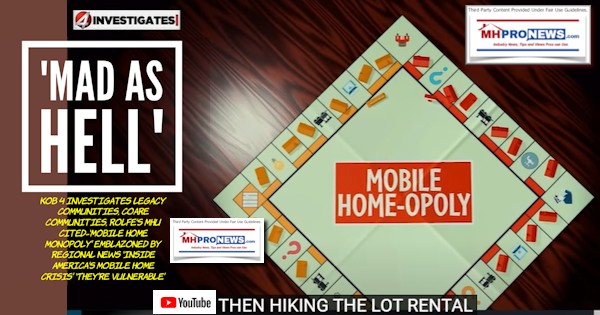



7) What the Google ruling may signal is a new wave of antitrust enforcement, per the sources cited herein. To be clear, some of these linked cases may or may not involving tying, and some of the class action suits underway may make other legal claims and arguments. That said, there appears to be an increased tempo to these class action/antitrust suits in manufactured housing. Perhaps because of the ongoing consumer involvement, the focus thus far seems to be more on the community side of the industry. But that doesn’t mean that it won’t spread to the production/finance/retail sectors of the industry, where Strommen asserted that apparent tying violations occurred. Keep in mind that Strommen also asserted that the Manufactured Housing Institute (MHI) appears to be directly involved in antitrust violations. Quoting Strommen’s legal thesis found here and here.
Berkshire Hathaway and its subsidiaries’ anticompetitive behavior is quite clearly injurious to consumer, but in this matter, they are not alone. It would appear that Cavco Industries and Skyline Champion are willing [de facto allies]. An additional [possible] antitrust violation, in the form of a conspiracy under Section 1 of the Sherman Act, would at this point seem [like a] fait accompli. This section declares: “Every contract, combination in the form of trust or otherwise, or conspiracy, in restraint of trade or commerce among the several States, or with foreign nations, is declared to be illegal.”94 However, this begs the question not of the method but the mode by which the three industry leaders are using to accomplish this. The answer to that would appear to be the industry trade association, the Manufactured Housing Institute. The Manufactured Housing Institute [MHI] acts not only as the public mouthpiece of the Big 3 manufacturers (in the name of the industry) but also appears to act directly on its behalf in its various lobbying endeavors.95
In the year 2000, Congress passed the Manufactured Housing Improvement Act.96 This act authorized “enhanced preemption,” which superseded all state and municipal standards, allowing manufacturers to deliver and install manufactured homes in separate jurisdictions provided they meet HUD standards.97 In 2008, the Federal Housing Financing Authority [FHFA], under the authority of the Housing and Economic Recovery Act of 2008, implemented an expanded Duty to Serve regulation, requiring Fannie Mae and Freddie Mac to facilitate home financing for very low-, low-, and moderate-income families.98 It should follow logically, then, that it should be cheaper and easier for residents of any state to finance and acquire a manufactured home. Unfortunately, this is not the case.
8) In the case of Parakeet Communities, per sources, they are not a member of MHI, and they are not a member of the MassMHA. So, as MHProNews has often reported, it would be going too far to say that every MHI member is guilty of some illicit or illegal behavior, nor would it be correct to ignore the reality that some with no association ties aren’t guilty or accused of improper or illegal actions.

9) That said, it may also be argued that some who have apparently violated state/federal laws, antitrust and others, have not yet been hit recently by a major legal action, civil or by public officials. SSK Communities faced legal action on behalf of residents, but after it became Flagship Communities and went public that has seemingly been muted. That noted, Flagship appears to have engaged in some similar behaviors that others have that are MHI members and which have been hit by antitrust action. Something similar might be observed about Frank Rolfe, Dave Reynolds and their business interests. They too have faced legal action, but that has not yet risen to the level of the kinds of litigation which has not hit some of the largest firms in the industry (see the cases linked above, which includes multiple members of MHI).




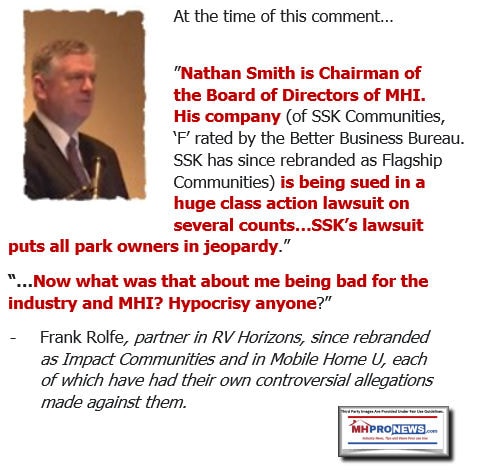
10) What is almost comical, if the issues were not so serious, is how some remarks by Rolfe and Nathan Smith/SSK Communities/Flagship Communities, may come back to bite them if they get hit by a serious antitrust/class action lawsuit(s).
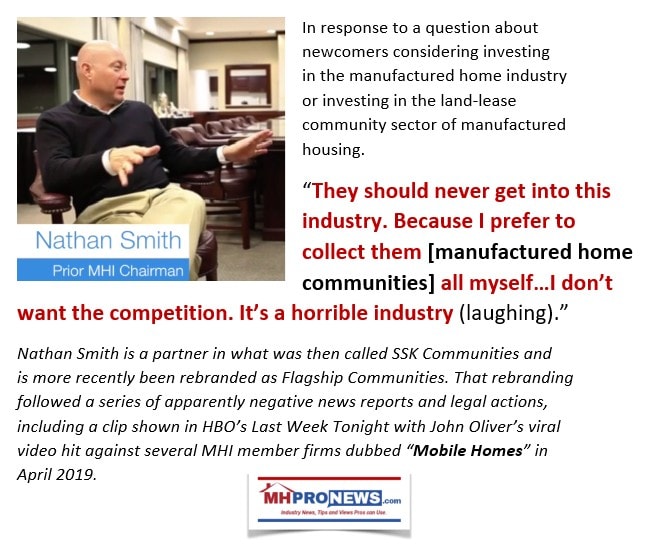
11) There are obvious political aspects to this. Note that Stoller said in the quoted item above that he doesn’t trust Kamala Harris (D) or deposed President Donald J. Trump (R) to press antitrust, perhaps an odd claim about Trump, given that it was during his time in office that the Google antitrust action was advanced (see above). Furthermore, Trump and his running mate, Senator J.D. Vance (OH-R) have each made statements in support of pressing antitrust, so it isn’t just deeds, there are words in alignment with those deeds. But in the case of Harris, Stoller previously said this on July 25, 2024 in an email to MHProNews and others.
Billionaire Orders Kamala Harris to Fire Lina Khan
LinkedIn founder Reid Hoffman gave $10 million to Harris’ campaign and demanded an end to Biden’s tariff and antitrust policies.
The New York Post and Reason both cited Senator Vance’s open support for antitrust efforts.
“I guess I look at Lina Khan as one of the few people in the Biden administration that I think is doing a pretty good job,” Vance said in February.
Five days ago, left-leaning Bloomberg said this:
Republican nominee Donald Trump called for his supporters to stop using Alphabet Inc.’s Google, calling the search engine “illegitimate”
Back in 2018, Trump told left-leaning Axios:
President Trump told “Axios on HBO” his administration is looking seriously at antitrust investigations of Google, Facebook and Amazon.
So, Stoller may be correct about the Harris-Walz campaign’s taking tens of millions of dollars in campaign contributions from those who have openly opposed antitrust enforcement are reasons to believe that if elected, she may not push for the harsher possible outcomes in cases that will likely not be finalized for some time. But if Trump-Vance get into office, Trump’s antitrust enforcers already demonstrably took action. He and Vance have both said recently statements that indicate that they want to continue to see that antitrust effort pressed.
Thus, as in so much of what occurs in business and in the legal realm, politics and who is in office can be a factor.

Recall that MHProNews previously reported that sources said that while Trump’s AAG over antitrust was in office, there was a meeting held by antitrust division attorneys that specifically discussed Clayton Homes and manufactured housing. While there has been no official confirmation of that claim, it seems to be in keeping with some of the remarks made by Makan Delrahim.
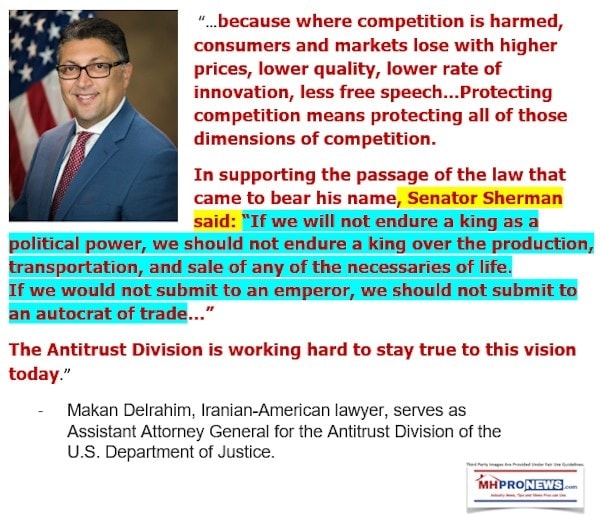
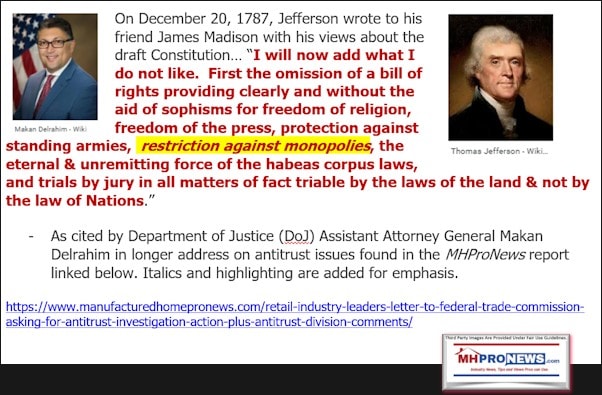
12) The future is obviously unclear. But when MHProNews began some 7 years ago (starting in 2017) to report on the importance of antitrust action, the evidence has only mounted since then that proved those concerns and related viewpoints and commentary to be on point.

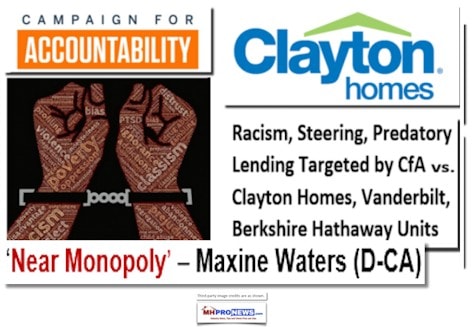
Meanwhile, anything that may embarrass the powers that be in manufactured housing, and/or at MHI, are routinely ignored or downplayed by others in MHIndustry trade media. But it is reports like this one, and those found linked above and below, that appear to be magnets for industry professionals and others who don’t find similar insights or commentary elsewhere in the industry, other than perhaps at the association level from MHARR. Attorney Mark Weiss led MHARR has raised numerous legal issues in the post-production sector over the years, as did his predecessor and former MHI VP, Danny Ghorbani.
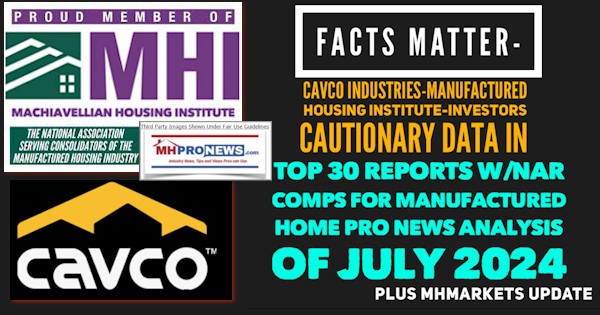
13) Before wrapping up this segment of this report with analysis, MHProNews would editorially observe that the Google ruling arguably should lead to the formation of a new post-production trade group. The one-two combination of a production (MHARR) and post-production trade group pressing key issues involving the industry and its consumers could revolutionize, in a positive way, the future of the industry.

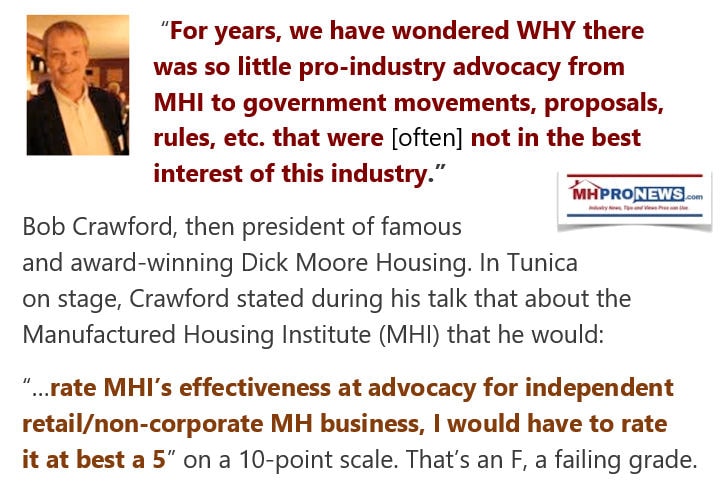


14) Antitrust advocate Stoller was quoted in the opening paragraph saying:
“Well, this decision means monopolization law is back. Exclusive contracts and arrangements are pervasive in American commerce, and until recently, executives could reliably exploit such deals without fearing that they might face any legal liability. But that era is over. This case is in the headlines, which means every single competent executive in America in any firm with market power is going to get a memo from their antitrust or general counsel on what they can and can’t do going forward. And they will likely begin changing their behavior so avoid being brought to court for monopolization.”
Time will tell, but on that level, Stoller may have a point. See the rigged system report below and others linked herein to go deeper. ##








Part III
Our Daily Business News on MHProNews stock market recap which features our business-daily at-a-glance update of over 2 dozen manufactured housing industry stocks.
NOTICE: following the TPG deal with CAPREIT, TPG has been added to our tracked stocks list below.
This segment of the Daily Business News on MHProNews is the recap of yesterday evening’s market report at the closing bell, so that investors can see-at-glance the type of topics may have influenced other investors. Our format includes our signature left (CNN Business) and right (Newsmax) ‘market moving’ headlines for a more balanced report.
The macro market moves graphics below provide context and comparisons for those invested in or tracking manufactured housing connected equities. Meaning, you can see ‘at a glance’ how manufactured housing connected firms do compared to other segments of the broader equities market.
- In minutes a day, readers can get a good sense of significant or major events while keeping up with the trends that may be impacting manufactured housing connected investing.
Headlines from left-of-center CNN Business – 8.9.2024
- After a rash of stolen cars, Hyundai and Kia’s new anti-theft software is showing results
- Markets saw a massive shift this week. Here’s what happened
- Stellantis to lay off up to 2,450 factory workers as classic Ram production ends
- Former BBC broadcaster Huw Edwards leaves Westminster Magistrates’ Court, London, where he pleaded guilty to three counts of making indecent images of children.
- BBC asks ex-presenter Huw Edwards to pay back $250,000 after he pleads guilty to having images of child sexual abuse
- Maduro says he will block X in Venezuela for 10 days, after spat with Musk over contested election
- America’s latest deliciously horrifying stadium food: cotton candy burrito
- UK riots show how social media can fuel real-life harm. It’s only getting worse
- Google and X lag peers in addressing non-consensual explicit images, lawmakers say
- How are you approaching your back-to-school spending?
- Republican presidential candidate former President Donald Trump speaks during a press conference at his Mar-a-Lago estate.
- Trump says he ‘made a lot of money’ so he should have a say in when you get a rate cut
- Elon Musk’s X just sued a nonprofit advertising group out of existence
- Customers didn’t stop spending. Companies stopped serving
- Retailers are tricking consumers into spending more with earlier-than-ever Halloween rollout
- Paramount cuts 15% of US staff, writes down $6 billion in latest sign of TV troubles
- OpenAI worries people may become emotionally reliant on its new ChatGPT voice mode
- Delta lashes out at CrowdStrike for its ‘vastly inadequate’ apology
- Dow closes nearly 700 points higher after latest jobless data brings better news for America’s labor market
- Mortgage rates plunge to lowest level in more than a year
- Samsung is recalling 1 million stoves to prevent pets from setting your home on fire
- The housing market just reached an incredible milestone
- Boeing’s new CEO is already making an overdue change his first day on the job
- Warner Bros. Discovery signals rapid deterioration of television business, sending stock plummeting
- Why Jay Powell refuses to be bullied by Wall Street
To see this image below in a larger size, depending on your device,
click the image and follow the prompts.
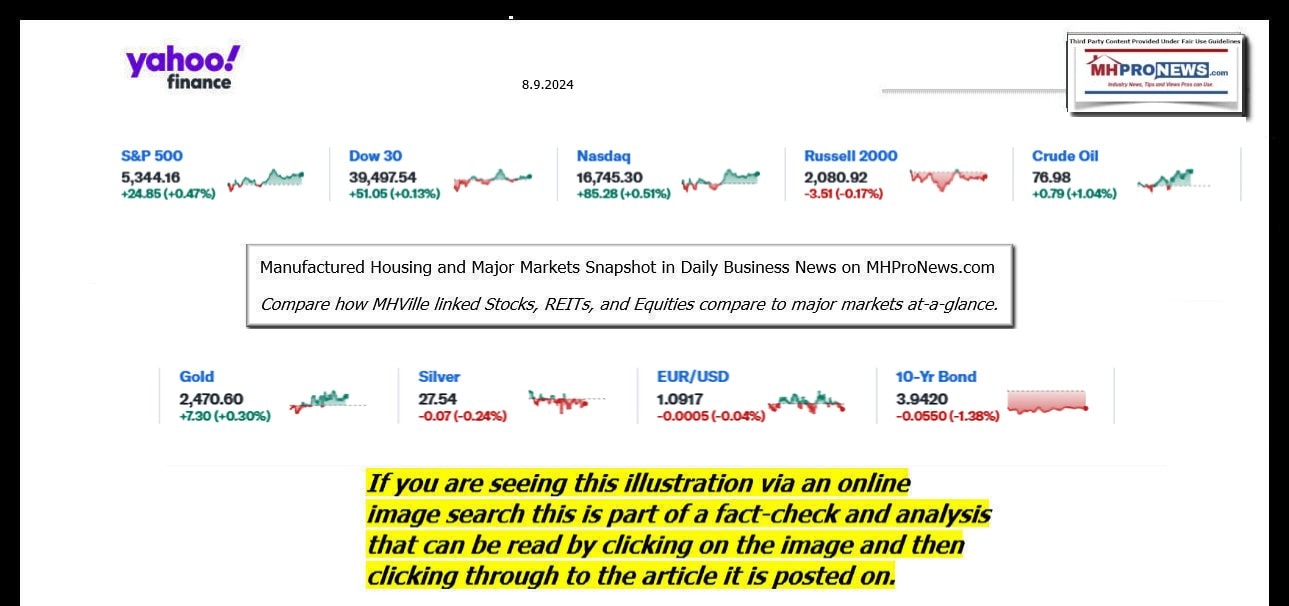
Headlines from right-of-center Newsmax – 8.9.2024
- Feds: Dems’ Convention Faces Threat of ‘Retaliatory’ Attack
- Federal security officials have been put on alert for the potential of retaliatory attacks against Democrats at the party’s upcoming convention in Chicago after the attempted assassination of former President Donald Trump, according to a threat assessment. [Full Story]
- US Will Keep Up Aid to Israeli Unit Accused of Abuses
- Threat Israel Didn’t Foresee: Hezbollah Drones
- US Warns Tehran of Steep Consequences
- WSJ: Harris More Forceful on Israel Than Biden
- IDF Launches Offensive in Khan Younis After Rocket Attacks
- Israel Agrees to Resume Gaza Truce Talks Next Week
- Lloyd Austin to Israeli Counterpart: US Support ‘Ironclad’
- IDF Minister: Hezbollah May Hit Before Iran
- Suspected Houthi Attack Targets Ship Off Yemen
- Newsmax TV
- Stauber: Harris Vetting Team ‘Fired by Now’
- Caroline Sunshine: Leaders ‘Take Tough Questions’
- Fmr Astronaut Scott: Space Station Issues Hard to Solve
- Steil: ‘Legacy Media’ Gives Harris a Pass
- Karoline Leavitt: Harris Needs to Answer Questions
- Ex-NATO Ambassador: Truce Now Would Reward Hamas
- Van Orden: Walz Should ‘Plead for Forgiveness’
- Blaine Holt: Stolen Valor a Big Deal for Vets
- Newsfront
- Rumble Supporters: Boycott Woke Dunkin’ for Platform Snub
- Supporters of Rumble are calling for a boycott against Dunkin’ after the company refused to run advertisements on the video platform…. [Full Story]
- Banks Demands Answers on Walz’s Military Record
- Jim Banks, R-Ind., is demanding answers from the Pentagon on [Full Story]
- Related
- Report: Walz Hosted Muslim Cleric for Events in Recent Years
- Italian American Group Accuses Walz of ‘Racism’
- Harris Responds to Walz Critics by Praising His Military Service
- HighGround Poll: Harris Has Slight Lead in Arizona
- Vice President Kamala Harris leads former President Donald Trump by [Full Story]
- Largest US Latino Group Endorses Harris
- The country’s oldest and largest Latino civil rights organization [Full Story]
- Related
- Biden to Campaign With Harris
- ABC Says Trump, Harris Agreed to Debate on Sept. 10
- Trump: We Have Enthusiasm Behind Us, Not Harris
- Feds: Dems’ Convention Faces Threat of ‘Retaliatory’ Attack
- Judge Grants Extension in Trump 2020 Election Case
- Tanya Chutkan, the district judge in former President Donald Trump’s [Full Story]
- Report: Biden’s Border Order Could Be Eased
- The lowest number of migrants apprehended at the U.S.-Mexico border [Full Story]
- Russia Declares Emergency in Kursk as Ukrainians Attack
- Russia declared a “federal-level” emergency in the Kursk region [Full Story]
- Related
- Russian Strike on Ukrainian Supermarket Kills 4
- Zelenskyy: Russia Must ‘Feel What It’s Done’
- Russia Battles Ukraine Troops After Shock Incursion
- Ukraine: Russian Bomb Kills 2 in Schoolyard in Sumy Region
- Russian Shelling Kills 2 in Ukraine’s Donetsk Region
- FEC Won’t Mandate Political Ad AI Use Disclosure
- The Federal Election Commission will not require political [Full Story]
- Harley-Davidson Takes Pounding at Annual Bike Rally
- For those who worship at the altar of Harley-Davidson, the massive [Full Story] | Platinum Article
- Illegal Immigration Focus Shifts to Northern Border
- Lawmakers are shifting some of their focus on border security to the [Full Story]
- Ad Trade Group to Shut Down GARM After X Lawsuit
- Advertising trade group World Federation of Advertisers told members [Full Story]
- Plane With 62 Aboard Crashes in Brazil
- A plane with 62 people aboard crashed in a fiery wreck in a [Full Story]
- Stellantis to Lay Off up to 2,450 Factory Workers
- Chrysler-parent Stellantis is laying off as many as 2,450 factory [Full Story]
- Tuberville Blames Biden, Harris for VA Crisis
- The Department of Veterans Affairs under President Joe Biden and Vice [Full Story]
- WH, RNC Agree on Selling Federal Land to Home Builders
- Strong bipartisan consensus has emerged on a possible solution to the [Full Story]
- Florida: Say Bye to Your Car Insurance Bill if You Live in These Zip Codes
- Otto Quotes
- Harvard Won’t Remove Sackler Name, Rebuffs Protests
- Harvard University has decided against removing from campus buildings [Full Story]
- FDA Approves First Nasal Spray for Allergic Reactions
- The U.S. Food and Drug Administration has approved ARS [Full Story]
- Paris Organizers to Replace Rusty Olympic Medals
- Organizers for the Paris Olympics say they will replace rusty Olympic [Full Story]
- Texas Hospitals Ordered to Report Immigration Data
- Beginning Nov. 1, hospitals in Texas will be mandated to collect and [Full Story]
- Goldman Sachs Fund Unit Leaves Climate Action 100+
- Goldman Sachs’ fund division is to leave investor engagement group [Full Story]
- Northeast Imperiled by ‘Debby’s Final Chapter’
- The remnants of Debby picked up the pace Friday, moving north and [Full Story]
- Venezuela’s Maduro Bans X for 10 Days After Musk Feud
- President Nicols Maduro said he has ordered a 10-day block on access [Full Story]
- Alabama Judge to Rule on Out-of-State Abortions
- A federal judge in Alabama soon will decide whether the state can [Full Story]
- Iranian Guards Navy Unveils Highly Explosive Missiles
- The Iranian Revolutionary Guards said on Friday that its navy has new [Full Story]
- 3rd Person Arrested in Foiled Taylor Swift Attack Plot
- A third teenager has been arrested in connection with a foiled attack [Full Story]
- Microsoft: Iranian Hackers Target US Election
- Iran is accelerating online activity that appears intended to [Full Story]
- Harris Talks to Media in Michigan
- Facing criticism from former President Donald Trump’s campaign that [Full Story]
- Zelenskyy: Russia Must ‘Feel What It’s Done’
- Ukrainian President Volodymyr Zelenskyy said Russia needs to “feel [Full Story]
- Venezuela’s Maduro Escalates Protester Crackdown
- Venezuela has intensified its crackdown on protesters and opposition [Full Story]
- States Sue Over Biden Rule Extending Health Insurance to DACA Immigrants
- Fifteen states filed a federal lawsuit Thursday against the Biden [Full Story]
- Van Jones: Must Fix Walz Military Record Controversy
- CNN’s Van Jones advised the campaign of Vice President Kamala Harris [Full Story]
- IRS Whistleblowers: Should Be Part of Hunter Biden Suit
- Two IRS whistleblowers claimed in court filings on Wednesday that the [Full Story]
- More Newsfront
- Finance
- Investors Snap Up Money Market Funds on Slowdown Fears
- U.S. investors shifted heavily into money market funds in the week ending Aug. 7, retreating from riskier assets during a stock market sell-off fueled by fears over an economic slowdown…. [Full Story]
- Related Stories
- Recession Risks Roil Markets But Not Yet Alarming
- Investors Expect Market Selloff to Slow, Stretch & Spread
- Slumping Tech Tempts Some to Brave Rocky Market
- Yen Carry Trade Blows Up, Sparking Global Sell-Off
- Rumble Supporters: Boycott Dunkin’ for Snubbing Platform
- Economy, History on Trump’s Side – For Now
- How to Negotiate a Pay Raise Amid Layoffs, Inflation
- Bob Odenkirk, Bill Burr Coming to Broadway in ‘Glengarry Glen Ross’
- More Finance
- Health
- More Than 1 in 4 Americans Over 50 Are Now Caregivers
- More than 1 in 4 Americans 50 or older are now caregivers, looking after at least one family member or friend who has a health problem or disability, a new poll has found. In all, 30% of all people in their 50s and early 60s provide care to at least one person, the…… [Full Story]
- Experimental Vape-Like Devices Treat Migraine, Asthma
- Autism Risk Increases If Sibling Has Diagnosis
- CDC: Child Vaccines Saved 1 Million in US Since 1994
- Post-Op Radiation May Stop Breast Cancer Return
To see this image below in a larger size, depending on your device,
click the image and follow the prompts.
